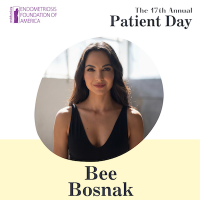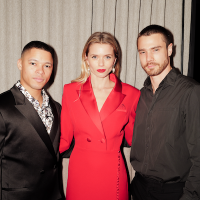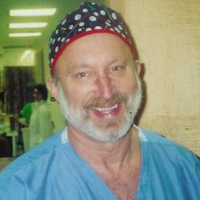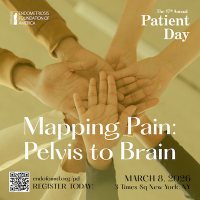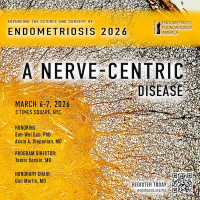Endometriosis Foundation of America: Blossom Ball – 2010
Intro
Interview 1 - Padma Lakshmi
You know the cause is obviously very close to my heart and I feel very fortunate that I am able to work with Dr Seckin, my cofounder of this Foundation. One hundred and seventy-six million women in the world suffer from endometriosis. It affects young girls and is one of the leading causes of infertility, and a lot of women, like me, are waiting to have kids - having a baby and being a mother. I wanted to do something to raise awareness so young women would not have to go through what I went through basically for the last 20 years of my life.
Interview 2 – Padma Lakshmi
Interviewer: What motherhood practices did you pick up from your mom that you carry to your day-to-day duties with your child?
Padma Lakshmi: Well, my mother has actually been spending a lot of time with me and I believe one of the things, that is greatest, is to have as many generations in the family involved with the child. My mother has very generously taken a leave of absence from work and spent the last six months with me; three months before she was born, and now when I was on set working on Top Chef. The thing I learned from my mother is just to be very physical with children, and to hold them, and to really nurture them and to give them a sense of security and well being, just by that body heat. I notice my mother does that with her granddaughter. I noticed that, and I remember that from when I was little.
Interviewer: Oh! That is incredible. Did you sing, when you were pregnant to your stomach, to your baby?
Padma Lakshmi: Did I sing? Yes, I sang a little, I read a lot.
Interviewer: You read a lot?
Padma Lakshmi: I read the New York Times out loud.
Interviewer: Out Loud?
Padma Lakshmi: I did.
Interviewer: Do you think that is going to help her as she gets older?
Padma Lakshmi: I hope so. I do not know. I mean you just do the best you can, I guess.
Interviewer: What other little odd rituals did you pick up during your pregnancy and that you thought helped to improve your baby’s health and your health and make you happy.
Padma Lakshmi: A member of my family made me a beautiful baby iPod, like a nano iPod with a lot of classical music; Indian classical music as well as Mozart and Brahms and Mendelssohn. I would stick the little iPod buds in my hands, and I would just make the baby listen, just a little bit, not too much, because amniotic fluid, I am told, is very sound conductive. But, you know, I think basically you just need to be consistent and loving with your children, at least that is what I think.
Interviewer: You look great! How did you lose your baby weight so quickly?
Padma Lakshmi: Well, I am nursing, that is a lot of it. But I also continued to work really hard at it. I box, I run up and down the emergency stairs of my building, I go on a treadmill, I jump rope. I try to watch what I eat, obviously, but it is hard, it is hard. I think it is okay. I just was doing sound editing for the show and actually saw myself on camera. I mean, today, I am 12 weeks after giving birth, but I went back to filming the show just after six weeks, and there is a big difference. I looked like a big woman. I do, and that is okay, I mean, I had a baby, and it is all right. I did not really feel the pressure to be stick thin right away because I was healing. My pregnancy was not an easy, or an ideal one, I just want to do whatever was healthiest for the baby. Also to be honest, I liked being bigger, I think that women who are round and big are also very sexy. I felt very voluptuous, I felt very sensual. I did not feel like I needed to be bone thin again. You know, I felt that I had gone through the process of motherhood from being a girl to being a woman, and I think there is great value in all kinds of body shapes.
Interviewer: Dr Seckin, what are you looking forward to most about tonight’s Blossom Ball?
Dr Seckin: Well, first of all we want everybody to have a good time, and enjoy. But more importantly, to emphasize today’s meeting, which is the Endometriosis Foundation Second Blossom Ball, in which we promote education, research, awareness, and early treatment for women who suffer from endometriosis, which are more than 8 million women, up to 10 million women, in the United States, and 180 million women in the world. These women do end up having severe pelvic pain; it is the number one reason for pelvic pain, the number one reason for infertility, and the major reason for hysterectomy for women who are in their late 30s. We want to prevent this. We are a preventative organization. We are an awareness organization. We want education for nurses. We want the education to go to schools, classes, in every corner of a female’s life we want it to be known. That is what we are trying to do.
Interviewer: What do you think is the hardest part about the process in raising awareness, in educating these youngsters in turn, about treatment issues?
Dr Seckin: I think resistance to change, resistance to learn, and the insurance industries resistance to appreciate these procedures and underpaying doctors for their good efforts. It is important. Also the traditional knowledge about endometriosis over the years has big value. That is very difficult to change. So, a new world order with respect to information for the last 15 years on endometriosis is not being applied yet. We want to bring those changes fast. Like anything else, resistance to change is the number one obstacle for us.
Interviewer: For teens who want to get involved in this, but since it is a little bit complicated and they may feel uncomfortable about talking about the subject, how can they still do that?
Dr Seckin: Well, the most important thing is if they know what this is about. The kids are very intelligent and they even bypass their mothers to get information, and there is tons of information, and they can even bypass the nurses. They are finding information with the right sources, with the internet, with the doctors that do this, and our Foundation is more than glad to supply information. We would love to help kids, girls younger than 20 years of age. Those are the ones that could be really helped well.
Interviewer: Great, Thank you so much. Have a great night.





